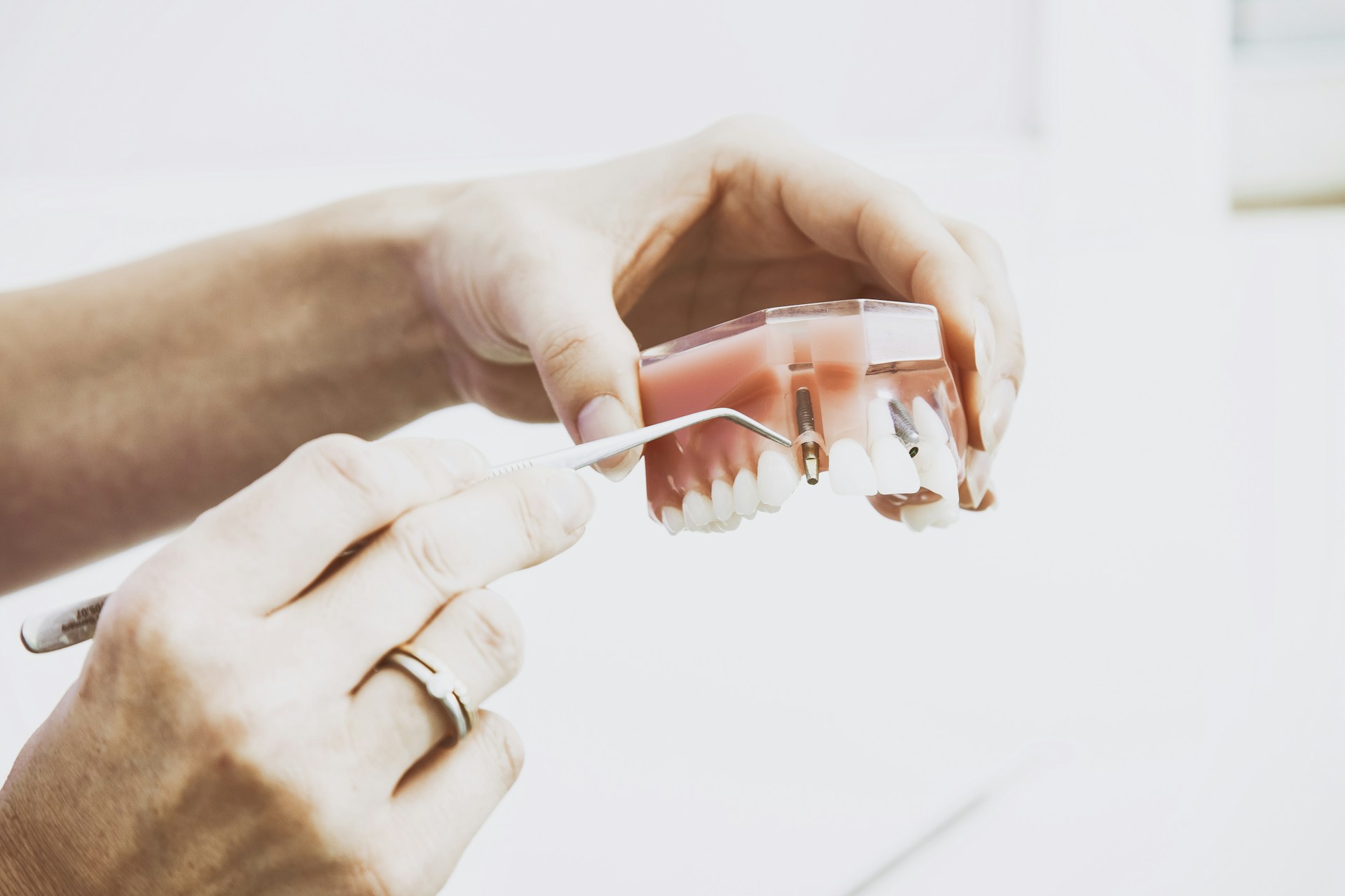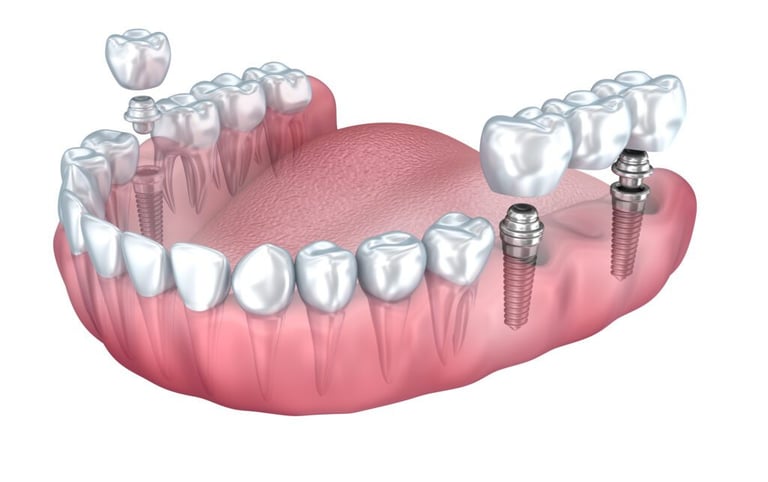SMILE- It costs nothing !!!
Understanding Dental Implant Pain and Management
9/13/2024
Are Dental Implants Painful
Over the past few years, dental implants have become a popular solution for replacing missing teeth. This can be attributed to the natural appearance that they give-just like your own teeth, their durability and long-term benefits.
Although people have become aware of dental implants, many still wonder,” Is getting a dental implant painful ?” .
The thought of undergoing a dental procedure often brings about concerns regarding pain and discomfort.
At the end of this blog, you will get to know -if it is really painful to get dental implants, are implants safe, do dental implants hurt forever and how to relieve pain from dental implants.
What are dental implants ?
Before diving into whether the procedure is painful, it’s essential to understand how a dental implant works.
Dental implants are artificial tooth roots, typically made of titanium, that are surgically placed into the jawbone to support a replacement tooth.
They serve as a strong foundation for the artificial teeth to be replaced.
The implant itself consists of three parts:
Implant Post: The screw-like structure inserted into the jawbone.
Abutment: The connector placed on top of the implant post.
Crown: The visible part that looks like a natural tooth, attached to the abutment.
Dental implants are known for their strength and longevity, offering a permanent solution for missing teeth.
Related : Should you consider dental implants ?
Do Dental Implants Hurt?
One of the most common concerns patients have is whether dental implants are painful. The simple answer is no, the procedure itself is not painful.
During the implant surgery, dentists use local anesthesia to numb the area being treated, ensuring you feel no sharp pain. If needed, sedation options are available to help patients relax during the procedure.
Most patients describe the sensation as feeling pressure or vibrations, but no significant discomfort. The real question about pain comes after the anesthesia wears off.
Dental Implant Procedure
Knowing how a dental implant is placed takes your fear of dental implant surgery.The implant procedure involves the following steps :
1. Consultation and Evaluation
Before the procedure, your dentist will conduct a thorough evaluation, including X-rays or 3D scans, to assess your oral health and determine if you're a good candidate for dental implants. This phase is painless and straightforward.
2. Placing the Implant
The surgical procedure involves inserting the implant post into your jawbone. Thanks to the local anesthesia, you won’t feel pain during this step. If you're anxious, your dentist may also offer sedation options like nitrous oxide or IV sedation to keep you calm and comfortable.
3. Healing Phase
After the implant is placed, the healing process known as osseointegration begins. This is when the implant fuses with your jawbone, creating a solid foundation for the crown. Some mild discomfort, swelling, or soreness is normal after the surgery, but it typically subsides within a few days.
Related : Understanding dental crowns
How to relieve pain from dental implant
Pain Management During the Procedure
During the implant surgery itself, you won't feel pain because your dentist will use local anesthesia to numb the area being worked on.
If you're anxious about the procedure, sedation options such as nitrous oxide (laughing gas) or IV sedation may be offered, which will keep you relaxed and comfortable throughout the surgery.
Local Anesthesia: This is the most common form of pain relief during the procedure. It ensures that you won't feel any sharp sensations during the implant placement.
You might feel some pressure or vibrations as the implant is inserted, but no pain.
Sedation Options: For patients with dental anxiety or for more complex cases, dentists may offer sedation options.
This could range from oral sedatives to intravenous (IV) sedation, depending on the level of relaxation needed.
Post-Surgery Discomfort
Once the anesthesia wears off, it's normal to experience some discomfort, similar to that of having a tooth extraction or other minor oral surgery.
This pain is usually mild to moderate and can be managed with over-the-counter pain medications like ibuprofen or acetaminophen. Here's what you might experience after the procedure:
Swelling: It's common to experience some swelling around the implant area and even in the face or gums. This should subside after a few days.
Soreness: Your gums and jaw may feel sore for a few days after the surgery. Following your dentist’s post-op care instructions can help ease the discomfort.
Minor Bruising: Some patients report slight bruising around the gums or face, but this is typically mild and temporary.
Tenderness: The implant site may feel tender to the touch for a few days, but the pain should gradually decrease.
The discomfort experienced after dental implant surgery can be easily managed with proper aftercare. Your dentist will likely recommend:
Over-the-Counter Painkillers: Medications such as ibuprofen (Advil) or acetaminophen (Tylenol) are usually sufficient to control pain after the procedure.
Ice Packs: Applying ice to the outside of your face near the surgery site can help reduce swelling and numb the area.
Soft Diet: Eating soft foods like yogurt, soups, and mashed potatoes for the first few days will help prevent irritation at the surgical site.
Oral Hygiene: Keeping the implant site clean is essential to prevent infection, but your dentist will give you specific instructions on how to care for the area without disturbing the healing process.
Most patients report that the pain is minimal and similar to that of a simple tooth extraction.
If any pain persists or worsens after a few days, it's important to contact your dentist, as this could indicate an infection or other complication.
Healing timeline for dental implant surgery
The recovery time for dental implants varies based on the complexity of the case and individual healing rates.
Here’s a general timeline for what you can expect:
1. First 24-48 Hours
Swelling and mild discomfort are common.
Stick to soft foods and avoid strenuous activity.
Use ice packs to reduce swelling.
Pain is usually mild and managed with over-the-counter medications.
2. 3 to 7 Days After Surgery
Swelling should subside.
Discomfort will decrease significantly.
You can begin to resume normal activities, though avoid chewing directly on the implant site.
3. 1 to 2 Weeks
The surgical site will feel much more comfortable, and the gums should start healing completely.
Any stitches (if used) are usually removed at this point.
4. 1 to 3 Months
During this phase, osseointegration occurs. The implant will fuse with the jawbone, providing a stable base for the crown.
Discomfort should be entirely gone, and the implant site should feel normal.
5. Final Crown Placement
After the implant has fully healed and fused with the bone, the permanent crown is placed, completing the procedure.
Once this is done, the implant should feel and function like a natural tooth.
How long does pain last after dental implant
After the initial recovery phase, most patients are surprised at how normal and comfortable their dental implants feel.
Because the implant fuses with your bone, it functions just like a natural tooth.
Unlike dentures, implants are stable and secure, so you won’t experience irritation or discomfort caused by slipping or moving dental appliances.
While the idea of getting a dental implant may seem daunting, the actual procedure is not painful due to effective anesthesia and sedation options.
Post-surgery discomfort is usually mild and manageable with over-the-counter medications, proper aftercare, and home remedies.
Recovery takes a few months for complete healing, but the results—a strong, natural-looking tooth—are well worth the temporary discomfort.
If you're concerned about pain, speak with your dentist about pain management options to ensure a smooth and comfortable dental implant experience.
Commonly asked questions :
What hurts more- Tooth extraction or dental implants ?
Tooth Extraction typically causes more immediate post-procedure pain, particularly for complex cases such as impacted wisdom teeth.
Complications like dry socket can also make the recovery process more painful.
Dental Implants, while a more invasive procedure, generally result in less post-operative pain compared to complex tooth extractions.
Most patients report manageable discomfort after implant surgery that diminishes within a few days.
Are dental implants safe ?
Dental implants have a high success rate and are widely regarded as a safe and reliable dental treatment.

Contact Smiles
drdeepi15@gmail.com
Dr. Deepika B.D.S
© 2025 SmileWide Dental. All Rights Reserved.
Have doubts ..?


